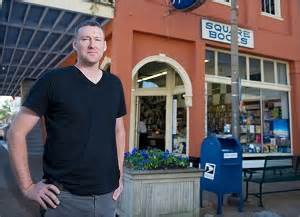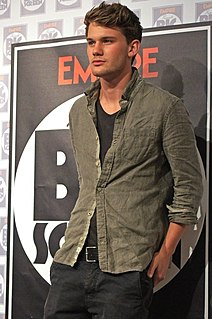A Quote by David McCullough
There are people who are trying to write history for the general reader who can be quite tedious. That said, I do feel in my heart of hearts that if history isn't well written, it isn't going to be read, and if it isn't read it's going to die.
Related Quotes
If you are going to write, say, fantasy - stop reading fantasy. You've already read too much. Read other things; read westerns, read history, read anything that seems interesting, because if you only read fantasy and then you start to write fantasy, all you're going to do is recycle the same old stuff and move it around a bit.
History is my passion. So I write what I love to read. I find that if I combine history with a strong, sensual romance, it is like a one-two punch. The reader doesn't want the history without the romance, and of course the heavier the history, the more it has to be leavened with a sensual, all-consuming love story.
I feel as though I never had choice not to be a writer. I feel in my heart of hearts that writing chose me and this is what I must do. I have no choice but to write, and to write, and to write, because my very life depends on it. And to assume that, of course, everyone in the entire universe wants to read what I've written.
As soon as I start to write I'm very aware, I'm trying to be aware that a reader just might well pick up this poem, a stranger. So when I'm writing - and I think that this is important for all writers - I'm trying to be a writer and a reader back and forth. I write two lines or three lines. I will immediately stop and turn into a reader instead of a writer, and I'll read those lines as if I had never seen them before and as if I had never written them.
Read a lot. But read as a writer, to see how other writers are doing it. And make your knowledge of literature in English as deep and broad as you can. In workshops, writers are often told to read what is being written now, but if that is all you read, you are limiting yourself. You need to get a good overall sense of English literary history, so you can write out of that knowledge.
Everybody is going to die, so people are enthralled by the possibility that they don't have to completely die, that there is something that comes afterward. It's like if you're going to France for the summer, you're going to read up on it. Everyone just wants to know where they're going, or if they're going anywhere.
I don't think about the reader in any conscious way that impacts the writing, as far as, Hey, most readers would like this! But at the same time, if it were presented to me: "John, you're going to write a novel. It's going to take you a few years. When you're done with it, there's a law that no one's allowed to read it." I don't think I would write it. I want someone to read it!
If it's all instruction, you get annoyed with it and bored, and you stop reading. If it's all entertainment, you read it quite quickly, your heart going pitty-pat, pitty-pat. But when you finish, that's it. You're not going to think about it much afterward, apart from the odd nightmare. You're not going to read that book again.
I'm an expert at killing time on planes now. I do a lot of reading. My secret sort of nerdy side is I'm quite into history so I read a lot of history books. Now I write for a few things and I've had a few history things published, which is cool. I indulge my nerdy side and it's kind of as far away as you can get from the acting world so that's nice as well.
The most important thing is you can't write what you wouldn't read for pleasure. It's a mistake to analyze the market thinking you can write whatever is hot. You can't say you're going to write romance when you don't even like it. You need to write what you would read if you expect anybody else to read it.






































